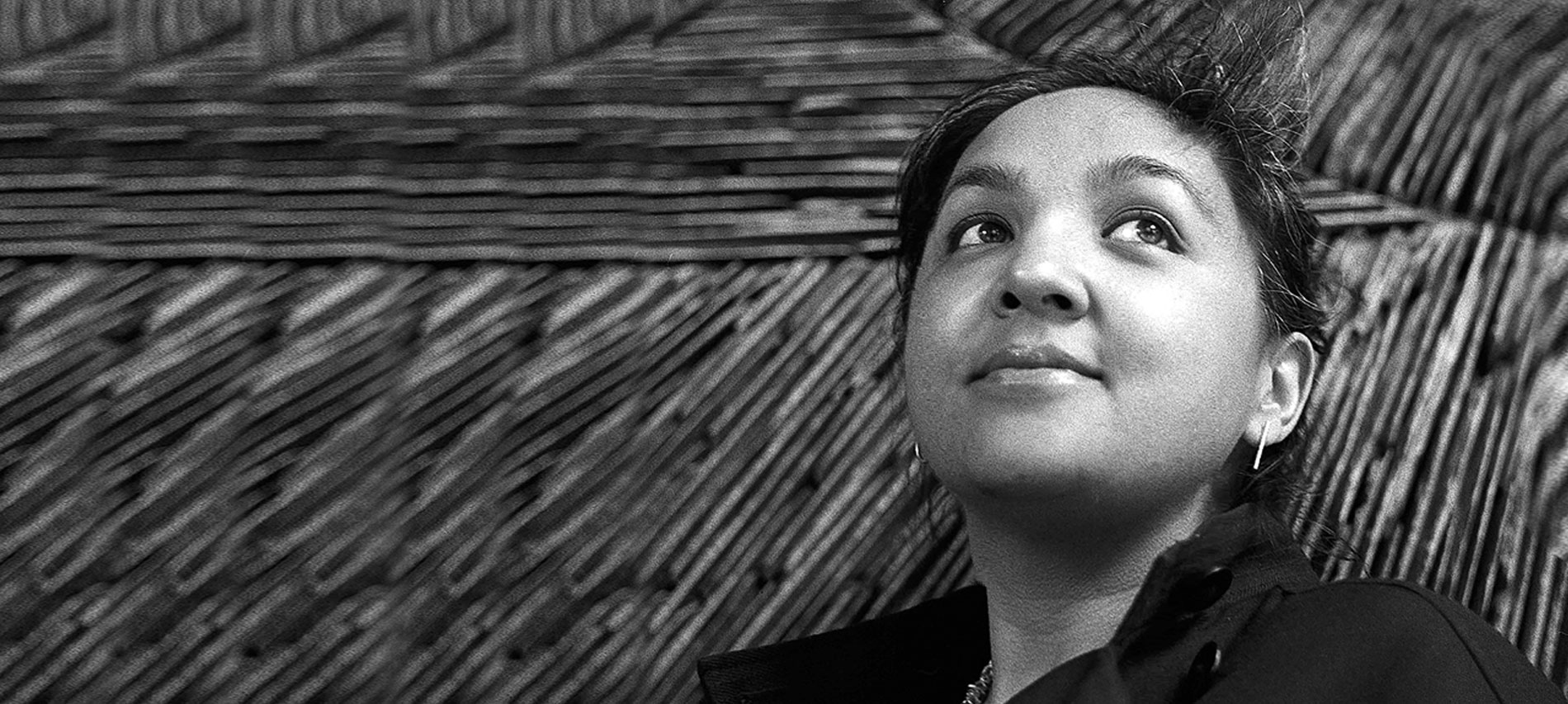
Preti Taneja was born and grew up in the UK. She teaches writing in prisons and universities, and has worked with youth charities and in conflict and post conflict zones on minority and cultural rights. She is the co-founder of ERA Films, and of Visual Verse, the anthology of art and words. We That Are Young is her debut novel. It has been longlisted for the Desmond Elliot Prize and the Jhalak Prize, and shortlisted for the Republic of Consciousness Prize.
————————————
I arrived in New Delhi in January 2012, carrying my battered copy of Shakespeare’s King Lear and 300 A4 pages of double spaced text: the first drafts of Jivan and Gargi, and half of the Radha sections of something called We That Are Young. The writing wasn’t wonderful, I remember feeling that. It was hard to capture the different voices of my characters from London. I worked a lot in my local library. I felt like a ‘writer’ there, or at least, one in training. But I wasn’t really convincing myself on the page. Shakespeare’s language and plot were a magnetic puzzle – I wanted to work with them but not give in to them. The book had to stand on its own terms.
We That Are Young was never going to be a realist novel if it was to cleave to an epic play that is set in a no-place, a no-time. I wanted the book to be a dark carnival, hyper-real, with a polyphonic structure and modernist sensibility in the lines. India as a setting can handle elements of the real and the mythological, the psychoanalytical tradition of the West and a circular sense of time in ways other settings can’t. Yes, I had high hopes – but working from books and memory in England, it read like the first draft it clearly was.
The stakes were high: I had lost my mother to cancer when I was 28. I cared for her, for almost eight years with my family, till she died. What should I do with the inheritance she left me? It included courage, an example of sacrifice and risk-taking, as well as the security she had worked all her life to leave me. Two years after, I had got a job I loved, reporting on minority rights abuses for an NGO. I had the chance to travel and met people who trusted me with their stories. All of us sharply aware of the gulf between those who have freedom of movement, freedom of speech and those who do not, and the responsibilities that brings. I had a regular sandwich and coffee order in a nearby café. I commuted against the tide of city bankers streaming out of Liverpool Street station. Then I turned 30, and I still wasn’t doing the thing I had said I wanted to do all my life. Write fiction. I knew something had to change.
I enrolled on a night-class on the far side of the city, reached via the stopping Circle Line, East to West. I got a portfolio of stories together, and applied for a part-time Master’s in Creative Writing, which I could study for around my job. Two years later, I got my degree. I knew I wanted to carry on teaching and writing. I handed in my notice at work. The next day the email came: I had won full funding for a PhD. To work on We That Are Young.
Four months in, and that same instinct to jump made me pack up my life. I found a place to rent in Delhi via endless online searches, and paid the deposit without actually seeing it first. Then I told my Delhi family and friends that I was coming to write a book based on Shakespeare, set in India and was going to live in a rental for as long as I could afford it. ‘Whatever,’ they said. ‘Just come.’
I rediscovered my second city, the place I’ve been coming to since I was a child, on new terms. There was a fermenting energy; there was creativity; there was so much rage. There were important books I could not get in the UK about Indian politics, men’s fashion, women’s rights. I kept notebooks – there ended up being 15 in total – and made daily cuttings from national newspapers and magazines. Journalistic training learned crossing borders and working in different parts of the world and (in an early, misguided incarnation) as a very junior financial reporter now got me into the back kitchens of hotels, expensive parties, the outskirts of the city. Everyone wanted to tell me about what was wrong with India. Corruption, inequality, misogyny, ‘tradition,’ pollution, caste, expansion, city planning, waste, child abuse, the building of the metro, politics, safety. There was also a forward momentum among certain classes and in the media: long held injustices were being highlighted; new possibilities for equality were being claimed. So many people I met were working, had been working for years for this.
I would write every day. The rest of Radha, all of Jeet and most of Sita was drafted as the heat became brighter. Against family advice I travelled to Goa in April. I got sick from the humidity and had to come back early. And then, finally I went to Srinagar. A person I will never be able to thank enough, took me, silent and wrapped in shawls, into parts of the city he said that even most Srinagar people don’t go to. He introduced me to artisans, traders, chefs who talked to me about their work, and their daily routines, their hopes for their children. I stopped writing and just listened. I celebrated my 35th birthday with my partner on a houseboat overlooking the Dal: the stay was a gift from my godmother, my mother’s dearest friend.
I don’t believe writers think about their own process – how, when, what with – until they are asked to. For me, there were some simple imperatives. I was 35. I had taken a pay cut and tried to make a career change. I had to finish the book, get it published, and from that, apply for teaching jobs, perhaps write the next thing – that was the plan. Finishing became a kind of obsession, driven by the PhD submission deadline, funding running out, the need to sell the novel and seek paid work. With the 15 notebooks, press cuttings and a stack of other people’s novels and non-fiction from across India and the diaspora, I returned to my childhood home in June 2012. One more house move, and I finished the first full draft of my manuscript by December. Then my agent sent it out and I submitted my PhD.
I got the PhD. But, We That Are Young found no favour with London or Delhi publishing. The editors said, ‘ambitious,’ ‘clever,’ ‘brilliant idea’ and ‘powerful.’ There was, ‘too close to the bone’ and variations on, ‘Shakespeare? Really?’ Everyone, I mean, everyone said, ‘no.’
I could still research and teach, I thought. I could try for an academic career, if fiction was not to be. I began to focus on that. But writing We That Are Young was like being possessed by five crazy characters: they would not leave me alone. I had to keep working on the book. I believed that the India I had seen, and the way people told me it was changing, the way the world was changing, had to be expressed in fiction, now, and I still wanted to try to do it. When I started the novel, there was no Trump, no Brexit. It was the dog days of Congress in India. It was before a brutal rape on a Delhi bus became world news. But anyone really looking could see what was coming. The rise of the right-wing in different parts of the world. Wave after wave of protests against corruption, war, and for social justice were taking place. There was Rhodes Must Fall, and calls for the decolonisation of public spaces and curricula. People were documenting it via film and non-fiction. Some fiction writers were also getting through.
When I finally sold the fourth complete draft of my manuscript to the UK independent publisher Galley Beggar Press, it was January 2016.
There’s a lot more to this story, including the people close to me, who wouldn’t let me give up on my endless editing. One round of which was done on a rainy holiday in Wales, where I sat in my Tshirt, with my laptop in the hotel bath, pulling an all-nighter while my long-suffering partner slept next door. That was the version before Galley Beggar said yes. Then there was even more editing, intricate line stuff – it was thrilling but exhausting for all of us, and it went to the wire – it was finished just 10 days before the book actually became a real object in a warehouse, waiting to go out.
Writing is hard, editing is hard. It all feels less like creation, more like excavation. I often read as I write – returning to find segments of non-fiction that feed my stories, or fragments of poetry and other peoples’ writing – the kind that makes me work even harder at my own. We That Are Young is now in the bookshops and online, on people’s shelves and TBR piles, maybe in their bathrooms or beach bags. In India, its beautiful Penguin Random House hand-painted cover suggests water, hair, mehndi, bloodlines. My five crazy characters are partying without me – I saw them in the airport bookshop in Kolkata, in Delhi, Jaipur, in Bangalore; people send me pictures of them in Glasgow, Oxford, Norwich and Mumbai. They are talked about on YouTube and in blogs, just as they are in the world of the book. It’s meta. As Radha might say.
We That Are Young ends with a beginning, placing whatever might come next in the reader’s hands. Since I finished it, real world events, some positive – the #metoo and #TimesUp campaigns, the steps towards decriminalising gay sex (again), ongoing protests against child rape; some horrific – including those headline cases of sexual violence, water running out in cities, toxic smog, the rise of the religious right and its fascist ideology, go on: ‘machinations, hollowness, treachery, and all ruinous disorders…’ as Gloucester puts it, in King Lear.
Meanwhile, I am meant to be working on the next thing. I don’t know much about that, but I know the process won’t change. It will start with reading. It always has.
—————-
Author Portrait: Rory O’Bryen
—————–









